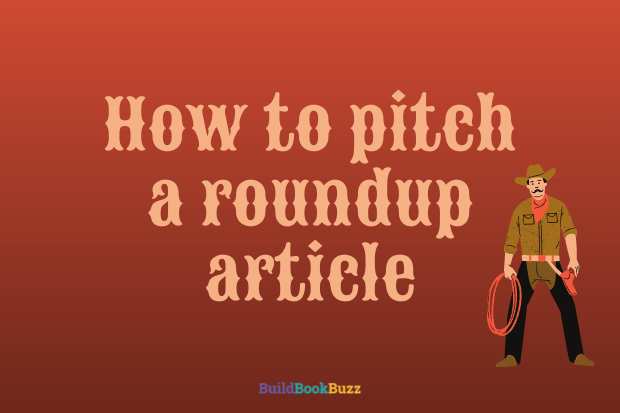How to pitch a roundup article
In “Promote your book with a roundup article,” I define a roundup as an article or broadcast segment that showcases products related to a specific topic, category, or theme. They’re typically positioned as the best, most interesting, newest, or time-tested options in that category.
You will start seeing a lot of them now as talk shows, magazines, newspapers, bloggers, podcasters, and content sites start creating holiday gift guides.
That article helps you generate roundup ideas for your book not just for the winter holidays but for year-round, and suggests what you might do with those ideas.
You’ll see that there are roundup opportunities for all types of books. Whether you write thrillers, self-help, romance, or business books, you can create a roundup around it.
There are roundup opportunities for all types of books. Whether you write thrillers, self-help, romance, or business books, you can create a roundup around it.Click to tweetRoundup topic examples
While roundups are often built around books (who hasn’t seen a “best summer beach reads” list?), they can also be focused on many types of products in a specific category or related to a single topic.
Category or topic roundups that include multiple product types are often seasonal:
- 20 holiday gifts for under $20
- Must haves for every back-to-school shopping list
- What every gardener needs to own
- Gifts every sports fan wants
- 10 Mother’s Day gifts she’ll never forget
Examples of book-specific roundups include:
- Best books to curl up with in front of a fireplace
- New cookbooks offering innovation from fresh voices
- Time-tested parenting books
- Memoirs you’ll never want to put down
- Books that will make you stay up all night reading
You can see the potential for your book already, right?
How to use your roundup article ideas
In addition to linking to actual published roundup examples, “Promote your book with a roundup article” explains how to turn your roundup article idea into a press release that you mass-distribute to the media and bloggers. I include a free press release template you can use for this. (My favorite press release distribution service is eReleases and that’s an affiliate link for a 33 percent discount.)
You can also turn your idea into a blog post or newsletter article.
But what if you want to “pitch” your idea to a few specific media outlets? Your idea might appeal to certain newspapers, a few magazines, or even a network television morning show, right?
Pitching your roundup to specific media outlets
It’s important to be thoughtful and targeted. Here’s how to do that.
1. Understand which media outlets are the best fit for your idea.
For example, you wouldn’t pitch AARP the Magazine on a story on “the best books to guide you through your first job,” right?
In one of the examples in the earlier blog post, an Adirondack mystery author pitching a roundup on books set in the Adirondack Mountains, best bets would be a daily newspaper in that part of New York State, Adirondack Life magazine, or a magazine for hikers.
2. Be clear on where your idea fits into the media outlet’s content.
If it’s a magazine, what section does it fit into?
If you’re targeting daily newspapers, which section is most likely to use your idea — business? Lifestyle? Sports?
When you’re pitching a TV talk show, consider whether your idea would be used as a sit-down chat or if could involve a demonstration with the host.
In your pitch, share where or how you think your roundup will best fit. This tells the person you’re pitching that you’re familiar with the outlet’s format — and that’s important.
3. Decide which individual should receive your e-mailed pitch at any outlet you’re pitching.
That will take some sleuthing, and could involve online research, going through back issues of the magazine online or at the library, using media directories at the library, or calling the media outlet.
Learn more about how to do that in “How to build a killer book publicity media list.”
4. Write and e-mail a great pitch letter.
A pitch letter is a sales letter that needs to convince an editor, reporter, or producer to use your idea.
In the letter, you’ll summarize your roundup idea and why it’s a good fit for that media outlet. In addition to your book, include a few other books or products you believe are a good fit so the media gatekeeper is better able to visualize the concept.
Learning how to write a solid pitch letter is so important that Build Book Buzz Publicity Forms & Templates has a fill-in-the-blanks form that walks you through the process (plus a sample letter). I’ve also included a lesson about it in the two “Book Marketing 101: How to Build Book Buzz” e-courses.
5. E-mail your pitch to yourself first.
For some reason, this last step helps me identify awkward phrasing or typos I missed before. I can’t explain why, but it gives me the distance I need to help me improve the pitch. It might help you, too.
Be both realistic and creative in your brainstorming to come up with an idea that media outlets will love.
What would be a good roundup article topic for your book? Please tell us in a comment.
(Editor’s note: This article was first published in August 2014. It has been updated and expanded.)
Like what you’re reading? Get it delivered to your inbox every week by subscribing to the free Build Book Buzz newsletter. You’ll also get my free “Top 5 Free Book Promotion Resources” cheat sheet immediately!


One Comment